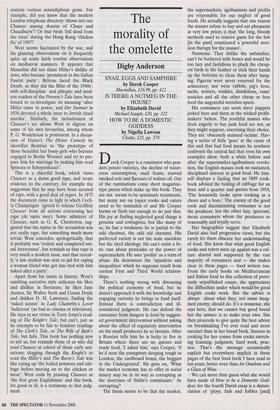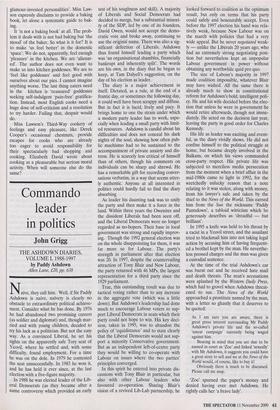The morality of the omelette
Digby Anderson
Derek Cooper is a ruminator who pon- ders potato varieties, the decline of water- cress consumption, snail feasts, starved smoked eels and flavours of walnut oil. Out of the ruminations come short magazine- type pieces which make up this book. They are not meant to be systematic treatments, but many are on topics cooks and eaters need to be reminded of and Mr Cooper knows or finds out enough to do just that. His joy at finding neglected good things is genuine and contagious, but like many of us, he has a weakness: he is partial to the odd chestnut, the odd old chestnut. His preferred variety is not the stale anecdote but the tired ideology. He can't resist a lit- tle rant about pesticides or the power of supermarkets. He uses 'profits' as a term of abuse. He denounces the 'injustices and inequalities' which he supposes result from current First and Third World relation- ships.
There's nothing wrong with discussing the political economy of food, but he doesn't approach it with the knowledge and engaging curiosity he brings to food itself. Instead there is contradiction and ill- considered judgment. He can defend the consumer from dangers in food by suggest- ed government intervention without asking about the effect of regulatory intervention on the small producers he so favours. After a Russian tells him he is lucky to live in Britain where there are no queues and ready food, 'I asked him,' says Cooper, if he'd seen the youngsters sleeping rough in London, the cardboard boxes, the beggars in the Underground'. He goes on, 'What the market economy has to offer in social misery may be in its way as corrupting as the doctrines of Stalin's commissars.' As corrupting?
The thesis seems to be that the market, the supermarkets, agribusiness and profits are responsible for our neglect of good foods. He actually suggests that one reason the masses refuse to buy and eat pheasants at very low prices is that 'the long, bloody methods used to reserve game for the few [in the past] constituted a powerful aver- sion therapy for the masses'.
Nonsense. They dislike the unfamiliar, can't be bothered with bones and would be too lazy and fastidious to pluck the cheap- est birds in the feather or stick their hands up the bottoms to clean them after hang- ing. Pigeons were never reserved for the aristocracy, nor were rabbits, pig's liver, melts, trotters, winkles, dandelions, rams' testicles and all the other cheap or free food the ungrateful wretches spurn.
His consumers can seem mere puppets jerked here and there at the wicked profit- makers' behest. The youthful masses who flock eagerly to buy junk food are not, as they might suppose, exercising their choice. They are 'obscenely maimed victims'. Hav- ing a series of little 'goes' at the cause of this and that bad food means he nowhere confronts the central fact that even his own examples show: both a while before and after the supermarket-agribusiness revolu- tion, the English masses took no sustained, disciplined interest in good food. He him- self displays a finding that an 1889 cook- book advised the boiling of cabbage for an hour and a quarter and quotes from 1954, The housewife looks upon cooking as a chore and a bore.' The enemy of the good cook and discriminating consumer is not the producer, but the other lazy, ignorant, mean consumers whom the producers so reasonably and loyally serve.
Her biographies suggest that Elizabeth David also had progressive views, but she rarely let them obscure her understanding of food. She knew that what good English cooks and eaters were up against was a cul- ture shared and supported by the vast majority of consumers and — she makes clear in these pages — food writers too. From the early books on Mediterranean and Italian food to this collection of previ- ously unpublished essays, she appreciates the difficulties under which would-be good English cooks work. But the advice is always about what they, not some imag- ined enemy, should do. It's a nonsense, she says here, that we cannot buy good bread but the answer is to make your own. She then proceeds to give quite the best advice on breadmaking I've ever read and more succinct than in her bread book. Success in cooking for her comes from cooks exercis- ing learning, judgment, hard work, prac- tice. That's the message occasionally explicit but everywhere implicit in these pages of the best food book I have read in ten years, better even than An Omelette and a Glass of Wine.
We can more than guess what she would have made of How to be a Domestic God- dess; for the fourth David essay is a denun- ciation of 'ploys, fads and foibles [and] glamour-invested personalities'. Miss Law- son expressly disclaims to provide a baking book, let alone a systematic guide to bak- ing.
It 'is not a baking book' at all. The prob- lem it deals with is not bad baking but 'the mood' of the baker. So what is it for? It is to make `us feel better' in the domestic `space'. We do not, apparently, feel enough `pleasure' in the kitchen. We are 'alienat- ed'. The author does not even want to make us into kitchen goddesses. We are to `feel like goddesses' and feel good with ourselves about our pies. I cannot imagine anything worse. The last thing eaters need in the kitchen is 'reassured' goddesses seeking self-indulgent 'pain-free' gratifica- tion. Instead, most English cooks need a huge dose of self-criticism and a resolution to try harder. Failing that, despair would do.
Miss Lawson's Third-Way cookery of feelings and easy pleasure, like Derek Cooper's occasional chestnuts, provide escapes for cooks who are already too eager to avoid responsibility for their spectacularly bad shopping and cooking. Elizabeth David wrote about cooking as a pleasurable but serious moral activity. When will someone else do the same?



























































































 Previous page
Previous page